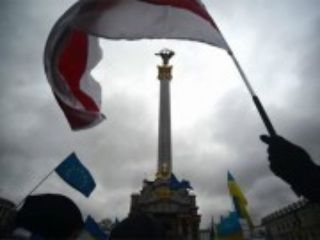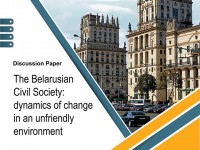Centre for European Transformation has conducted the third comprehensive study in form of monitoring of the implementation of the UNESCO Convention on the Protection and Promotion of the Diversity of Cultural Expressions by the Republic of Belarus.
Belarusan reverberations of the Euromaidan

During the latest months, the Ukrainian events have been influencing directly the situation in Belarus. It is possible to say that Belarus is watching Ukraine narrowly. “Revolution”, “mutiny”, “coup d’état” — whatever it may be called — it cannot leave Belarusans untouched.
There is an emotional response — practically all strata of society are existentially affected by these events:
- There is a large-scale information war on pages of social networks and mass media right now;
- Analysts and experts are comparing the Belarusan situation and the Ukrainian one;
- Public and political groups are explicitly or implicitly supporting or opposing the Euromaidan with the help of their statements, supervising human rights defending missions, fund raising to help the victims, their visits to the Maidan, etc.;
- Official Minsk reacts composedly, but it does everything it can so as to avoid similar scenarios in Belarus;
- In ordinary everyday situations, people are having heated discussions about Ukraine.
The Russian military intervention in Crimea has grasped public attention completely. At the same time, on the Belarusan political field, despite the current election campaign in local councils, there is still a total slack. Belarusans are looking narrowly at the Ukrainian Euromaidan, but its free spirit has not seized them yet. The Ukrainian revolution can hardly be repeated in Belarus, but the Euromaidan’s effects can already be felt palpably in the country now.
1. The events in Ukraine have deepened the split in public opinion between different parts of Belarusan society. The traditional dividing line between the pro-regime part of society and its pro-democratic part has become more obvious; internal conflicts and contradictions among democrats have become highlighted as well.
The pro-regime part perceives the Ukrainian transformations negatively and occupies an alert position; their attention is focused on the chaos and destruction of the Ukrainian statehood structures, the necessity to mobilize efforts in order to prevent probable, however, mostly imaginary threats (revolution export, intrusion of Ukrainian insurgents upon Belarus, direct interventions, including military ones, of the West and/or Russia, etc.), the importance of the stability and integrity of Ukraine for Belarus’ interests is underlined.
In their turn, Belarusan democrats are evaluating the Euromaidan in different ways. The basic line of division passes between “revolutionary radicals”, who support the overthrow of the political regime with the help of mass street protests (“Plošča” [“Ploshch”] as Belarusan “Maidan”*), and “moderated evolutionists”, who are aimed at negotiable strategies of transformations. As a whole, “evolutionists” moderately support the Ukrainian revolution, but among them there is a part that distances from them because the Euromaidan has crossed the permissible line and ceased to be an example of non-violent resistance. Besides, many of them are frightened by the growth of influence of the Ukrainian right and nationalistic groups (basically, it is the left and liberal public) after the Euromaidan’s victory. Also, among the “moderate” ones, there is a group who proposes to reform the Belarusan regime with the help of a “dialogue with the nomenklatura” — they support a possibility to carry out “authoritarian modernization”. The Euromaidan for them is an embodiment of revolutionary chaos and dangers of revolutionary transformations.
Meanwhile, it is impossible to say unequivocally to what extent the Euromaidan’s victory has inspired the protest part of Belarusan society. It is obvious that the majority of Belarusans now is not ready to pay such a high price for freedom and democracy, which reduces the general protest temperature.
Result: Fragmentation and deepening of the split of public opinion.
Forecast: Continuation of the split and radicalization of positions; rapprochement between the pro-regime part and supporters of a “dialogue with the nomenklatura”.
2. Radicalization of public opinion exists, but it does not turn into real actions of political groups in Belarus. During these months, a lot of Belarusans have visited Kyiv to support Ukrainians, but the Euromaidan has not rendered practically any influence on the balance of forces inside the country, and it is hardly necessary to expect it to happen in the future. The level of protest moods in Belarus is several times lower than that in Ukraine and the outspread of the Ukrainian revolution seems to be a very fantastic scenario. However, as a rule, vivid events in the neighboring countries do affect the level and character of public activity. Therefore, during the next year, with a high degree of probability, there can appear new groups and initiatives aimed at organizing mass actions, which will lead to an insignificant growth of the number and mass character of street actions. Still, already by the time of the presidential election in 2015, if the condition of the political scene is not changed, this activity will have returned to the usual condition.
Result: “Virtual” activity does not turn into real activity.
Forecast: Insignificant growth of mass activity within a year.
3. In no small measure, the aforementioned results and forecasts will be achieved due to the repressive policy of the Belarusan authorities. They have already taken “preventive” steps to minimize the risks of implementing the Ukrainian scenario in Belarus — in particular, additions and changes have been introduced into the law “About martial law” and the possibilities of applying violence against peaceful demonstrators have been expanded. It has happened regardless of the fact that Lukashenko, unlike what Yanukovych was required to do, does not need to urgently pass repressive laws — they have been working successfully in Belarus already for more than ten years. It is expected that in the near future the field of independent civil forces will be cleansed; there will be preventive “conversations” of special services with democratic activists, liquidation of “undesirable” and “suspicious” public organizations, and other, already traditional for Belarus measures.
Result: Preventative measures against the growth of mass activity.
Forecast: Preventive measures against activists of civil society and democratic opposition.
4. The Belarusan authorities are very reserved in their evaluations of the Ukrainian events. The revolutionary Euromaidan is extremely unpleasant for them, but the European integration of Ukraine and the preservation of good inter-country relations with the southern neighbor are quite beneficial for them. Remaining Putin’s only friend to the west of Russia, Lukashenko applies for the most part of Russia’s grants and credits. At the same time, the attempts of Russia to destabilize the situation in Ukraine and to question its territorial integrity, as well as the means Russia resorts to for this purpose, are frightening both Belarusan authorities and population of the country. Declaring its loyalty to Moscow at the official level, official Minsk is going to try to level Russia’s influence in Belarus in all possible ways. Besides, Minsk will try to force Moscow to buy its “stocks of Eurasian integration” at a higher price.
Result: Growth of Russophobia among the Belarusan authorities and a part of the population.
Forecast: There will be certain actions to strengthen even more the state (bureaucratic), information, and military safety of Belarus. The cost of Eurasian integration for Moscow is going to increase; Minsk will receive a new package of grants. Lukashenko can try to act as intermediary between Russia and the new authorities of Ukraine.
5. The apparent give in the Belarusan authorities’ relations with the EU, which began after the Vilnius summit of the Eastern Partnership, is going to continue. After the Ukrainian events, the low Euroenthusiasm of the Belarusan authorities will be even lower. At the same time, the fact of Russia’s military aggression against Ukraine in Crimea forces Belarusan power to intensify the normalization of its relations with the West. It puts the Belarusan authorities in a difficult situation. Looking back at Ukraine, the authorities of Belarus see the way the peaceful Euromaidan has turned into an anti-governmental national revolt and behave extremely carefully. Being afraid of the strengthening of pro-European forces in the country thanks to bigger openness in relations with the EU, the state will aspire to eliminate any subjects, which are alternative to the state, such as structures and organizations of civil society and political opposition, from the process of cooperation. Most likely, instead of real civil society, the dialogue with the EU will be joined by loyal to the state groups of experts from among adherents of a “dialogue with the nomenklatura”. The width of interaction with the EU, its format and sectors of cooperation will be strictly defined by the Belarusan authorities (we shall call it a “controllable rapprochement”).
Result: Decrease of the Belarusan authorities’ Euroenthusiasm.
Forecast: Controllable rapprochement with the EU will continue. The relations normalization process will go more intensively.
6. The Ukrainian revolution revives the hopes to implement a similar scenario in Belarus among external promoters of democracy in Belarus. It means that their readiness to support (including financially) all kinds of political ventures staking at mass activity during the election period in 2015 is going to grow. Understanding such a change of the trend, “cynical temporizers” inside and outside Belarus are trying on an image of “revolutionary romanticists”. There will be inevitably doubtful projects of “transferring the Ukrainian experience”, which do not correspond much to the actual Belarusan situation. In the light of the fact that there will not be any real essential growth of mass activity in Belarus, it is not going to bring anything good.
Result: Growth of “revolutionary” optimism among external actors of the democracy support system.
Forecast: Growth of all sorts of projects aimed at transferring the Euromaidan experience to Belarusans. Growth of revolutionary expectations among the democratic environment in the absence of real preconditions.
___________________________
* Both “Plošča” [“Ploshch”] and “Maidan” mean “Square” in the Belarusan and Ukrainian languages accordingly.
About author:
Andrei Yahorau is the Director of the Centre for European transformation (CET), Master of Political Science. He graduated from Belarusan State University, department of political science, and holds a master’s degree in political science. He has been working in the political research area since 2001. The focus of research interests: transformation of the former Soviet Union space, civil society, political transformations in Belarus and the Eastern Partnership region, European studies.
CET in the social networking services:
Others
-
Civil society in Belarus 2015-2021: from stable development to new challenges
We present a collection of articles “Civil society in Belarus 2015-2021: from stable development to new challenges”.
-
The Belarusian Civil Society: dynamics of change in an unfriendly environment
We present a Discussion paper of dynamics of changes in the Belarusian civil society in 2015-2017.
-
Belarusan human rights defenders’ view on human rights activity and questions of cooperation between Belarusan human rights organizations
We present a research results report of Belarusan human rights organizations sector.
-
Social base of transformation programs in Belarus
We present a sociological research report (abridged version) of social base of transformation programs in Belarus.








Comments
Andrei Yahorau — Al Jazeera: “Lukashenko is irresponsible”
He said Belarus would likely face economic tightening not only as a result of the coronavirus pandemic but also a Russian trade oil crisis that worsened this past winter.